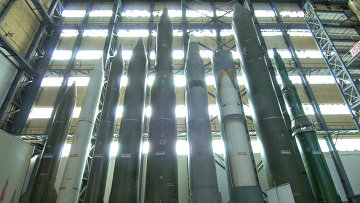MOSCOW, March 18 - RAPSI. In response to increased threats posed by North Korea and Iran, US Defense Secretary Chuck Hagel has announced that the US will add additional ground-based ballistic missile interceptors to its existing arsenal, a move that has been widely interpreted as the Obama administration making good on the American president’s promise last spring of “more flexibility” once reelected.
Last March, a private moment between US President Barrack Obama and Russian Prime Minister Dmitry Medvedev was unexpectedly broadcast to the world when a nearby microphone was left running during a press photo op.
Obama was heard telling Medvedev in connection with the missile defense debate that had driven a wedge between the countries, “After my election, I have more flexibility.” Medvedev then vowed to pass the information along to President Vladimir Putin.
Russia and NATO had initially agreed to cooperate on the so-called European missile defense system at the Lisbon summit in November 2010. However, further talks between Russia and the alliance have floundered over NATO’s refusal to grant Russia legal guarantees that the system would not be aimed against Russia’s strategic nuclear deterrent.
NATO and the United States insist the shield is designed to defend NATO members against missiles from emerging threat nations like North Korea and Iran, and would not be directed at Russia. The alliance has vowed to continue developing and deploying its missile defenses, regardless of the status of missile defense cooperation with Russia.
The final phase of the so-called European Phased Adaptive Approach envisioned the deployment of US SM-3 Block IIB interceptors by 2020 “to help better cope with medium- and intermediate-range missiles and the potential future ICBM threat to the United States.”
Hagal announced that this final phase would be restructured. In a speech delivered at the Pentagon that afternoon, he stated, “As many of you know, we had planned to deploy the SM-3 IIB as part of the European Phased Adaptive Approach. The purpose was to add to the protection of the U.S. homeland already provided by our current GBIs against missile threats from the Middle East. The timeline for deploying this program had been delayed to at least 2022 due to cuts in congressional funding.
Meanwhile, the threat matures. By shifting resources from this lagging program to fund the additional GBIs as well as advanced kill vehicle technology that will improve the performance of the GBI and other versions of the SM-3 interceptor, we will be able to add protection against missiles from Iran sooner while also providing additional protection against the North Korean threat.”
Still, the US argues that the move was unrelated to Russia’s angst over the missile defense program, according to a New York Times report.
The report quoted Pentagon Press Secretary George Little as having stated, “The missile defense decisions Secretary Hagel announced were in no way about Russia.”
Another Obama administration official, speaking on the condition of anonymity, told the New York Times that, ““There’s still an absolutely firm commitment to European missile defense, which is not about Russia; it’s about Iran these days… If there are side benefits that accrue with Russia, so be it. But that wasn’t a primary driver.”



